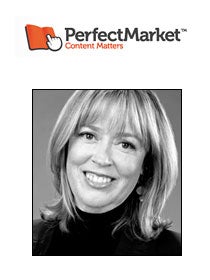 Julie Schoenfeld is CEO of Perfect Market, a publisher-side technology company.
Julie Schoenfeld is CEO of Perfect Market, a publisher-side technology company.
AdExchanger.com: With “Perfect Market,” the allusion to financial markets is hard to ignore. Is there a connection?
JS: Perfect Market is kind of a “good luck” domain for Idealab. It was the original name and domain for two of Idealab’s success stories. In addition to the good karma, we chose the name Perfect Market because the Web provides a highly efficient (though not quite perfect) market for content. In this market, the highest quality content generally monetizes at the highest rates. Since our goal is to ensure that the highest quality content also gets the most traffic and makes the most money from search, we thought the name Perfect Market, an allusion to the market for content on the Web, would be a perfect name for our company.
What problem is Perfect Market solving?
Search engines have changed the way people consume information.To survive in today’s search-based world, traditional publishers need to focus on content creation, aggregation, and monetization via search and other performance-based models.
Traditional publishers have not focused on effective ways to monetize users who visit their site through search. When these users come in through search engines if they do not find what they are looking for, they leave-usually by hitting the “back button”. This is one of the problems we try to solve. Our technology platform allows publishers to identify the best articles that address the user’s query. We then help the publisher monetize that visit by matching relevant advertising to the article and the term searched. Publishers do not have actionable information about their content’s revenue potential. Perfect Market’s new Vault product is a powerful platform that provides tremendous insight into the value of a publishers’ new and evergreen content.
Where do you see this product fitting with publishers’ search and display revenue optimization?
Perfect Market’s solution is a complement to publishers’ existing display optimization. Traditional publishers do not target the search users with a tailored experience. Perfect Market’s unique patented approach enhances the optimization work that is being done for the Brand pages. By understanding what the user is searching for, PM allow publishers to surface the content matched to that search as well find the best advertising for that query. The results of this approach have been additive and significant.
What is your company’s target market?
Professional publishers of online branded content. We work with traditional print and online publishers like The Los Angeles Times and The San Francisco Chronicle, as well as online-only properties.
AdExchanger Daily
Get our editors’ roundup delivered to your inbox every weekday.
Daily Roundup
What pricing models does Perfect Market use for its customers? Any thoughts around engagement pricing?
Perfect Market delivers a complete search monetization service to publishers and shares in the revenues generated. This performance model gives Perfect Market the incentive to work hard to make sure our technology is delivering the highest ad revenues possible for publishers.
Is it possible to re-sell datasets collected through Perfect Market systems? It would seem publishers could use this for ad targeting purposes that are resold to marketers, for example?
No. Our technology is used by publishers to analyze the monetization potential of their own content.
You’ve been involved in entrepreneurial enterprises before? What makes this one different?
This is my third time running a venture-backed start up. I am still on the board at OE Waves, which I founded in 2000, and I was president of Net Effect Systems that was sold to Ask Jeeves. Perfect Market is different because it’s rewarding to focus on an important problem. The publishing industry is facing a time of upheaval and flux, so it’s exciting to be part of a company actively helping publishers stay alive and thrive online.
Why do you think there aren’t more women in the executive ranks of technology startups? How could this change?
You couldn’t tell by looking at Perfect Market’s executive team. Half of our executive team is women including myself. The best way to change the ratio in the industry is to analyze where women are succeeding in startups; there are a lot of examples of this. Investors would do well to find women who are further along in their careers to form the executive teams.
What surprises you about the world of online publishing today? Is there something that publishers still need to catch on to, in your opinion?
I am surprised by the fact that approximately 10% of advertising dollars are being spent on the web. This means that 90% is being spent offline. This does not match user behavior nor does it take advantage of how effective and measureable online advertising can be. I think this is partly because advertising sales organizational structures and processes are slower to change. Publishers need think about a world where online advertising matches online engagement then design sales strategies that match. In particular, we’re helping top publishers get their fair share of $11 billion dollar search advertising industry.
A year from now, what milestones would you like the company to have accomplished?
One year from now, I expect to be profitable with rapidly growing revenue. I hope to provide our current and enhanced services to the largest web publishers on the planet. I also hope that the advertising ratio of dollars on the web will begin to reflect where the readers are and that the content from major brands command the highest advertising dollars. This will validate Perfect Market’s motto “Content Matters”.
Follow Perfect Market (@perfectmarket) and AdExchanger.com (@adexchanger) on Twitter.












